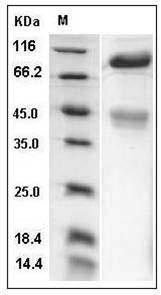-
Product Name
Mouse c-Met/HGFR (His Tag) recombinant protein
- Documents
-
Description
Hepatocyte growth factor receptor (HGFR), also known as c-Met or mesenchymal-epithelial transition factor (MET), is a receptor tyrosine kinase (RTK) that has been shown to be overexpressed and/or mutated in a variety of malignancies. HGFR protein is produced as a single-chain precursor, and HGF is the only known ligand. Normal HGF/HGFR signaling is essential for embryonic development, tissue repair or wound healing, whereas aberrantly active HGFR has been strongly implicated in tumorigenesis, particularly in the development of invasive and metastatic phenotypes. HGFR protein is a multifaceted regulator of growth, motility, and invasion, and is normally expressed by cells of epithelial origin. Preclinical studies suggest that targeting aberrant HGFR signaling could be an attractive therapy in cancer.
-
Protein name
Met protein
-
Protein short names
C-MET; AUTS9; RCCP2; HGF; HGFR; MET; AI838057; PAR4
-
Uniprot ID
F8VQL0
-
Gene Name
Met
-
Source/Expression Host
Human Cells
-
Expression Plasmid/cDNA
A DNA sequence encoding the mouse MET (NP_032617.2) extracellular domain (Met 1-Asn 929) was fused with a polyhistidine tag at the C-terminus.
-
Protein Species
Mouse
-
Molecular weight
The recombinant mouse Met is a heterodimer composed of the proteolytically cleaved ? and ? subunits. The ? and ? heterodimer consists of 916 amino acids and has a predicted molecular mass of 102 (? =32 + ?=70) kDa. The apparent molecular mass of the rmMET heterodimer thus is approximately 43 kDa and 85-95 kDa respectively in SDS-PAGE under reducing conditions due to glycosylation.
-
Purity
> 90 % as determined by SDS-PAGE
-
Activity
Measured by its ability to compete with mouse C-MET for binding to immobilized human HGF in a functional ELISA assay.
-
Validations

Mouse c-MET / HGFR Protein (His Tag) SDS-PAGE
Related Products / Services
Please note: All products are "FOR RESEARCH USE ONLY AND ARE NOT INTENDED FOR DIAGNOSTIC OR THERAPEUTIC USE"
